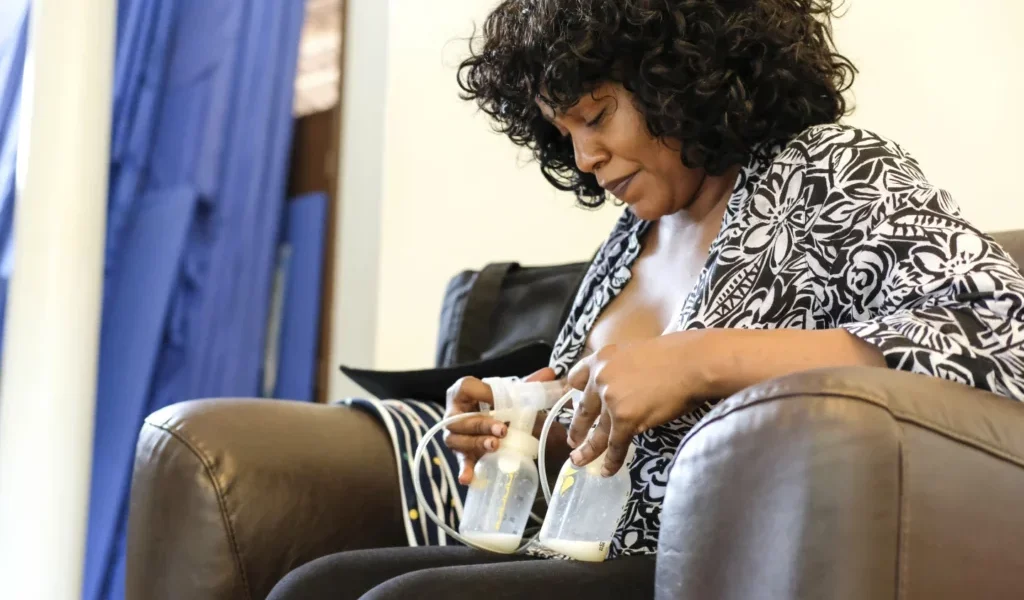
IN early 2023, Caroline Ikendi faced a life-threatening situation after undergoing an emergency Caesarean section to remove a stillborn baby and save her two preterm infants. One of the babies had only a 2 percent chance of survival, and without breast milk—which Ikendi couldn’t produce—their chances were slim.
Desperate, Ikendi sought breast milk donors and found a neighbour willing to share a few millilitres at a time. ‘You go and plead for milk. You are like, “Please help me, help my child,”’ Ikendi told The Associated Press (AP).
The neighbour’s help continued until Ikendi discovered the ATTA Breastmilk Community, a Ugandan group dedicated to collecting and donating breast milk to mothers in need. The nonprofit, launched in 2021 in Kampala, provided the breast milk Ikendi’s babies needed, free of charge, until they were strong enough to leave the hospital.
ATTA, backed by grants from organisations and individuals, is Uganda’s only group outside a hospital setting that conserves substantial amounts of breast milk. Hospitals and homes with babies born too soon or too sick to latch onto their mothers’ breasts frequently reach out for support.
A community effort
Since July 2021, over 200 mothers have donated breast milk to support more than 450 babies, delivering over 600 litres of milk, according to ATTA’s records. Many donors contribute multiple times and help recruit new donors, said ATTA administrator Racheal Akugizibwe.
‘We are an emergency fix,’ Akugizibwe said. ‘As the mother is working on their own production, we are giving [her] milk. But we do it under the directive and support of lactation specialists and medical professionals.’
She added, ‘Every mother who has given us milk, is kind of attached to us. They are we; we are them. That’s what makes it a community.’
ATTA uses social media platforms like Instagram to call for donors. Women who wish to donate undergo screening for HIV and Hepatitis B and C, and receive guidance on safe handling and storage of the milk.
Humble beginnings
ATTA was founded by Tracy Ahumuza, who started the initiative from her home after experiencing personal grief. Following the death of her newborn, Ahumuza began lactating and sought ways to donate her milk. Initially, ATTA matched donors with recipients, but this proved unsustainable due to the pressure on donors. The group then began collecting and storing breast milk, keeping donors and recipients anonymous.
Despite its success, ATTA faces challenges in meeting demand. Procuring storage bags in large quantities and covering testing costs are significant hurdles. Donors are also required to own freezers, which can be a financial obstacle.
‘The demand is extremely, extremely high,’ Akugizibwe said, ‘but the supply is low.’
Making a difference
Lelah Wamala, a chef and mother of three in Kampala, has donated milk twice. Her motivation came from witnessing the plight of mothers whose premature babies were dying due to lack of milk. ‘Being a donor is a time-consuming responsibility, but this is the right thing to do,’ she said.
Breast milk from donors is transported via motorcycle courier on Kampala’s busy streets to ATTA’s storage facility and then delivered to parents in need.
ATTA aims to establish a full-fledged breast milk bank with the capability to pasteurize milk, a service necessary in a country where many women lack lactation support. Dr. Doreen Mazakpwe, a lactation specialist collaborating with ATTA, emphasised the importance of a supportive community for mothers facing lactation issues.
‘Investing in productive infrastructure is key to accelerating Africa’s structural transformation,’ Mazakpwe said. She advises mothers on establishing their own milk supply within about a month of receiving donated breast milk, which then allows ATTA to help new mothers in need.
Overcoming social challenges
In a socially conservative society, pioneering services like ATTA’s often raise eyebrows. Even recipients sometimes worry that babies might inherit bad habits from donors. Despite these challenges, ATTA continues to provide critical support.
‘If you don’t breastfeed, there is a lot of negativity,’ said Ikendi, whose premature babies survived on donated milk. ‘Society looks at you as though you’ve just literally refused to breastfeed.’
Ikendi described the struggle of seeing her babies in intensive care, tiny and on oxygen therapy. Her babies, a boy and a girl, received donated breast milk for two months.
One recent morning, an emotional Ikendi held her children, expressing gratitude. The donated milk ‘contributed 100 percent to our babies’ growth,’ she said.
ATTA’s efforts exemplify the power of community and compassion in overcoming adversity and ensuring the health and survival of the most vulnerable.













